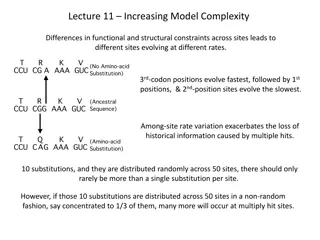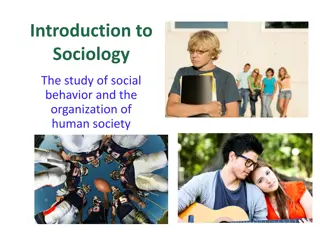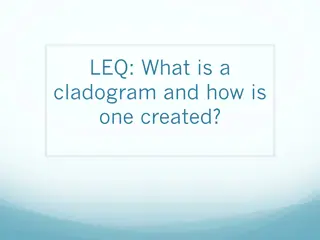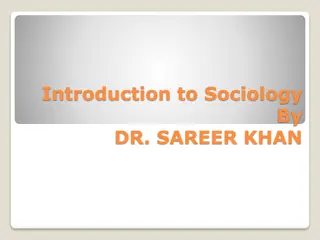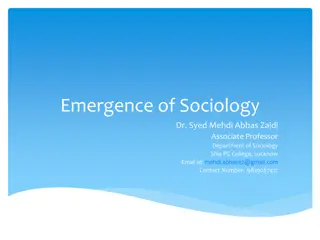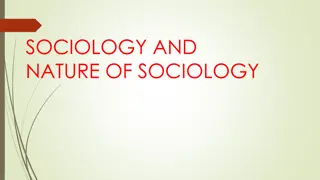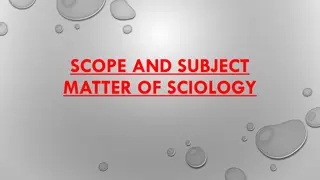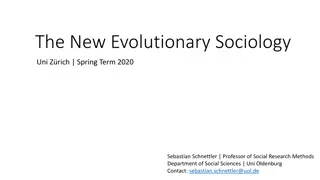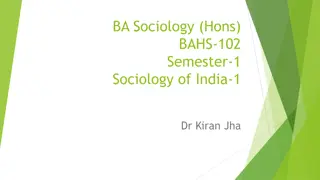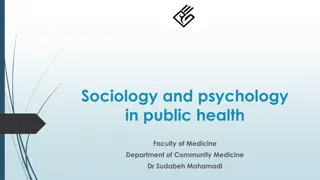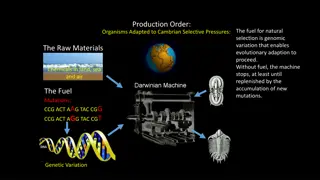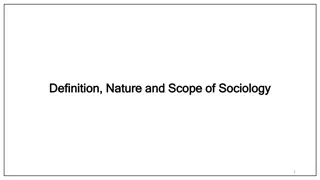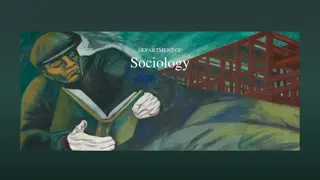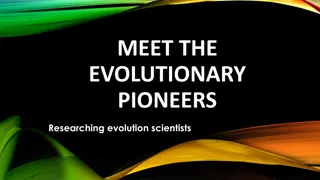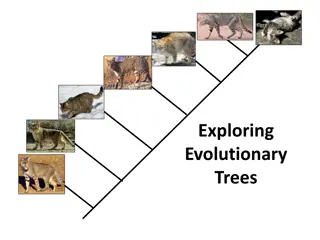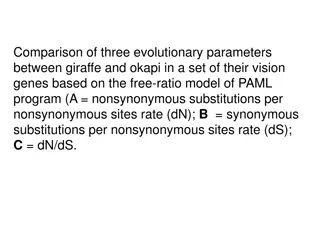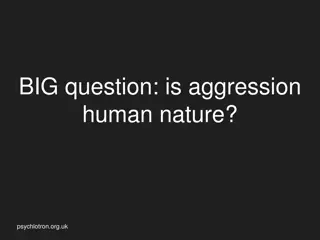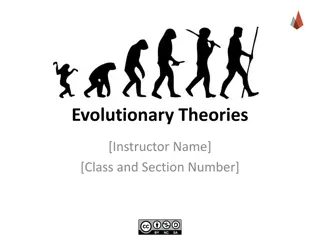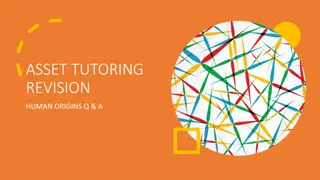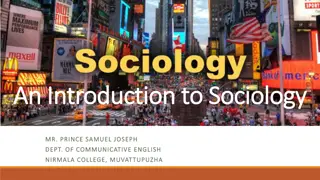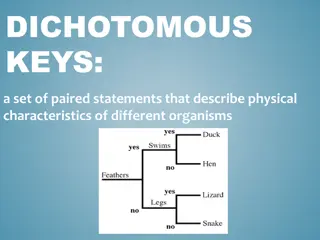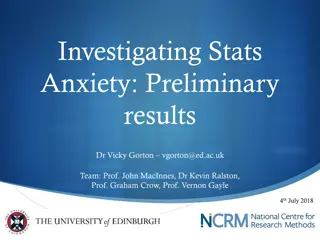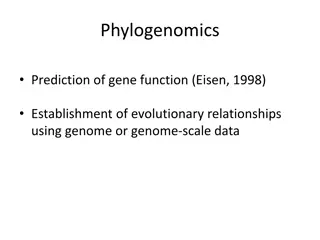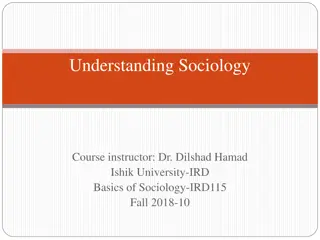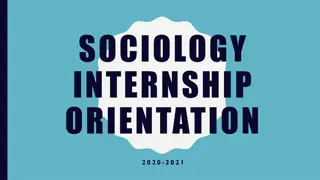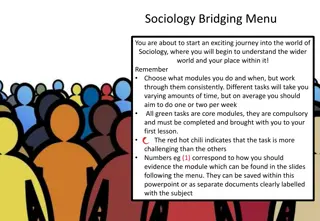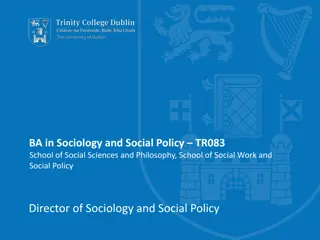Understanding Sociology: An Introduction to the Science of Society
Sociology is the scientific study of interactions and social groups, encompassing the nature of society, social relationships, and human behavior. Coined by August Comte, it evolved as a separate discipline from philosophy, focusing on social life and dynamics. This lecture covers the basic definiti
2 views • 23 slides
Evolution and Plant Systematics Lecture Overview
This lecture outline delves into the concepts of evolution, unity, and diversity of organisms on Earth, covering topics such as fossils, Lamarck and Darwin's theories, adaptation, natural selection, artificial selection, Carolus Linnaeus' systematics, plant evolution, and the demonstration of evolut
5 views • 26 slides
Comparative Sociology
Comparative Sociology is a specialized branch that compares societies to provide generalizations, focusing on the structure and jurisdiction of groups and organizations. It involves studying affinities and disparities to predict outcomes. The discipline is closely related to Social Anthropology. Com
3 views • 15 slides
Evolutionary Models in Molecular Biology
Differences in functional and structural constraints across sites lead to varying rates of evolution in molecular sequences. Understanding the complexities of site-specific rates, among-site rate variation, site-specific rates models, invariable sites model, and continuous methods is crucial for acc
6 views • 15 slides
Understanding Sociology: The Study of Social Behavior
Sociology is a broad discipline that examines human interactions, behaviors, and how they are influenced by social structures, categories, and institutions. Sociologists ask key questions to understand the connections between everyday life and societal forces. By analyzing relationships between indi
1 views • 32 slides
Phylogenetic Status of Peripatus: Exploring its Systematic Position
Peripatus, known as claw bearers, exhibits characteristics of both annelids and arthropods, making it an intriguing species in the study of evolutionary biology. Considered as an intermediate link between these two phyla, Peripatus raises questions about its classification and evolutionary history.
0 views • 10 slides
Understanding Cladograms and Phylogenetic Analysis
Cladograms are used in cladistics to illustrate evolutionary relationships between organisms based on shared ancestral and derived characters. They are created by grouping species by common descent, forming clades that include an ancestral species and all its descendants. Valid clades are monophylet
0 views • 11 slides
Comprehensive GCSE Sociology Families Study Guide
Explore GCSE Sociology Families topic through a PowerPoint presentation with detailed information on family forms, types of family/household, key term definitions, and various tasks for students to complete. The guide encourages students to work steadily through the topics, make detailed notes, and
0 views • 111 slides
Exploring Sociology: A Comprehensive Overview
Sociology is a science that delves deep into the study of society, its structure, and dynamics. From its historical roots to modern contributions, this discipline provides insights into social relationships, institutions, and the impact of society on individuals. By understanding human behavior with
0 views • 22 slides
The Emergence of Sociology: A Historical Overview
Sociology, derived from Latin and Greek roots, has evolved over centuries through various stages, influenced by social, economic, and political factors. Key thinkers like Plato, Aristotle, Hobbes, Locke, Rousseau, Montesquieu, Comte, Durkheim, and Marx have shaped the discipline. The Industrial Revo
1 views • 23 slides
Sociology and Common Sense: Exploring the Boundaries
Sociology and common sense intersect in intriguing ways, with common sense offering raw material for sociological theories yet lacking the validity and reliability that sociology strives for. While common sense is rooted in tradition and often status quoist, sociology challenges the taken-for-grante
2 views • 11 slides
Understanding the Origins and Development of Sociology
Sociology, as the science of society, emerged in the 19th century in Europe due to factors like the Industrial Revolution and successes in physical sciences. Influential early sociologists like Auguste Comte and Herbert Spencer contributed to the foundational theories of sociology. Emile Durkheim fu
0 views • 11 slides
Scope and Subject Matter of Sociology: An Overview
Sociology encompasses a wide range of studies, from individual interactions to global social processes. Sociologists have debated the scope and subject matter of sociology, dividing it into formal/specialistic sociology and synthetic/general sociology. Different scholars have proposed various approa
4 views • 20 slides
Evolutionary Sociology Seminar: Exploring Human Behavior Through Interdisciplinary Perspectives
This seminar at the University of Zurich, led by Prof. Sebastian Schnettler, delves into the realm of evolutionary sociology, examining the impact of genetics, hormones, and social processes on human behavior. The course integrates biology and sociology, offering a variety of approaches to understan
0 views • 11 slides
Historical Development of Sociology in India: Phases and Significance
The historical development of Sociology in India is explored through key phases from 1773 to 1950. The first phase, characterized by ethnographic research, laid the foundation for Sociology, Anthropology, and Indology. The second phase witnessed the growth of Sociology as a profession with empirical
2 views • 10 slides
Sociology and Psychology in Public Health: Exploring Common Links and Differences
Sociology and psychology intersect in public health studies, examining individual behavior and social structures. Commonalities include dedicated subfields for health and illness research, while differences lie in focus areas. Discover the impact of sociology in public health, historical contributio
0 views • 92 slides
Insights into Evolutionary Adaptation and Genetic Variation
The production order highlights the essential role of genomic variation as fuel for natural selection, driving evolutionary adaptation. The Cambrian Explosion timeframe reveals a rapid increase in evolutionary adaptation, showcasing the appearance of diverse animal phyla over a relatively short peri
5 views • 6 slides
Understanding Sociology: Definition, Power, Imagination, and Scope
Sociology is the systematic study of human society, examining how societal power shapes individuals, the sociological imagination connects personal troubles to public issues, and the scope of sociology involves researching social life, developing theories, critiquing society and policies, aiding pol
0 views • 7 slides
Exploring Sociology at Dartmouth College
Sociology at Dartmouth College delves into social relations shaping individual behavior, connecting people, and fostering social change. The program offers flexibility in course selection, hands-on experiences, and opportunities for independent research. Students engage in qualitative and quantitati
6 views • 7 slides
Understanding Assessment Criteria in GCSE Sociology
Assessing evidence in WJEC Eduqas GCSE Sociology involves evaluating candidates based on AO1, AO2, and AO3 skills. The assessment objectives emphasize knowledge, application, analysis, and evaluation of sociological theories, concepts, evidence, and methods. Understanding mark bands, successful resp
4 views • 21 slides
Subjects in Focus: Philosophy, Psychology, Education, Sociology, and Library Science
Delve into the realms of knowledge through subjects like Philosophy, Psychology, Education, Sociology, and Library Science, each offering a unique perspective on understanding and dealing with the vast expanse of human knowledge. Philosophy explores truth through Logic, Psychology delves into the hu
0 views • 25 slides
Computing Triplet and Quartet Distances Between Evolutionary Trees
Study on computing triplet and quartet distances in evolutionary trees, comparing rooted vs. unrooted, binary vs. arbitrary degree trees. Discusses algorithms, experimental results, and evolutionary tree construction methods. Includes analysis on cultural phylogenetics and evolutionary tree comparis
0 views • 27 slides
Understanding Taxonomy and Classification in Biology
Scientists use classification to group organisms logically, making it easier to study life's diversity. Taxonomy assigns universally accepted names to organisms using binomial nomenclature. Carolus Linnaeus developed this system, organizing organisms into species, genus, family, order, class, phylum
0 views • 11 slides
Evolutionary Pioneers: Anning, Darwin, Wallace - Key Figures in Evolutionary Theory
Meet the evolutionary pioneers - Mary Anning, Charles Darwin, and Alfred Russel Wallace, who played crucial roles in the development of evolutionary theory. Learn about their groundbreaking discoveries, challenges faced, and lasting impact on the scientific community.
0 views • 7 slides
Exploring Evolutionary Trees and Family Lineages
Dive into the world of evolutionary trees and family lineages through captivating visuals and informative illustrations. Explore the relationships between species, understand genetic connections, and discover how traits evolve and spread through generations. From evolutionary history to family trees
0 views • 25 slides
Comparative Analysis of Evolutionary Parameters in Giraffe and Okapi Vision Genes
This presentation compares three evolutionary parameters (dN, dS, dN/dS) between giraffe and okapi in a set of vision genes using the free-ratio model of the PAML program. The images illustrate the differences in nonsynonymous and synonymous substitutions, as well as the ratio of nonsynonymous to sy
0 views • 4 slides
Understanding Aggression: Exploring Its Evolutionary Roots
Delve into the complexities of human aggression, questioning whether it is inherent or a learned behavior. Explore evolutionary theories and biological perspectives on the causes of aggression, examining how factors such as genetics, brain structures, hormones, and environmental pressures may influe
0 views • 11 slides
Understanding Evolutionary Theories and Strategies
Exploring evolutionary theories such as Sexual Selection Theory and Gene Selection Theory sheds light on how characteristics evolve for mating advantage. Insights into intersexual and intrasexual competition offer a deeper understanding of mate selection preferences. Gene selection mechanisms influe
0 views • 20 slides
Exploring Human Origins Through Hominid Fossils and Evolutionary Traits
Delve into the fascinating world of human origins, examining hominid fossils, anatomical traits, and evolutionary evidence. Learn about early species like Ardipithecus ramidus, differentiate African apes from modern humans, and analyze the genetic lineage supporting human evolution. Explore tables,
0 views • 14 slides
Understanding Sociology: Definition, Characteristics, and Importance
Sociology, the scientific study of society, explores the social nature of humanity, social relationships, institutions, problems, and more. It delves into the characteristics of sociology as an independent, categorical, and generalizing science and discusses its uses in enriching culture, aiding soc
0 views • 23 slides
Understanding Dichotomous Keys and Cladograms in Evolutionary Biology
Dichotomous keys are utilized to classify different organisms based on their physical characteristics, while cladograms depict evolutionary relationships. Derived traits play a crucial role in understanding evolutionary history, indicating features present in later organisms but not earlier ones. Pr
0 views • 16 slides
Investigating Stats Anxiety: Preliminary Results on Sociology Students
The study conducted by Dr. Vicky Gorton and team examined stats anxiety among first-year Sociology students from Edinburgh and Lancaster University. They developed two questionnaires to assess anxiety levels and attitudes towards statistics among students. Findings revealed insights into students' p
0 views • 14 slides
Understanding Phylogenomics and Gene Function Prediction in Evolutionary Biology
Explore the significance of phylogenomics in predicting gene functions and establishing evolutionary relationships using genome-scale data. Learn about the challenges of using single genes or a few genes in phylogenetic analysis, the importance of analyzing multilocus data, and the need for multiple
0 views • 24 slides
Exploring the Basics of Sociology: Understanding Society and Culture
Dive into the fundamentals of sociology with this course taught by Dr. Dilshad Hamad at Ishik University. Learn about sociological concepts, perspectives, and the significance of culture in shaping individuals and societies. Understand the differences between micro and macro sociology and gain insig
0 views • 17 slides
Exploring Sociology: Understanding Society and Its Dynamics
Sociology is a field that challenges assumptions and encourages critical thinking about societal structures and processes. Students of sociology examine various aspects of society, such as gender, media, health, and more, through a critical lens. The program offers a range of modules focusing on cla
0 views • 4 slides
Sociology Internship Program Overview
Explore the Sociology Internship Program for the academic year 2020-2021, designed to provide students with hands-on experience in sociological research. The program focuses on connecting academic studies with real-world applications, offering valuable career insights and fostering essential career
0 views • 18 slides
Master of Philosophy in Sociology Program at Hong Kong Shue Yan University
Gain a Master of Philosophy (M.Phil) degree in Sociology from Hong Kong Shue Yan University in a research-focused program. The program entails completing 2 Graduate School courses, 2 department courses, conducting thesis research, and defending the thesis. Financial assistance is available, and furt
0 views • 6 slides
Department of Sociology at University - Overview and Programs
The Department of Sociology was established in 2009 under the Faculty of Literature, offering courses in General Sociology, Institutional Sociology, and Applied Sociology. With a dedicated team of academic staff and a comprehensive curriculum, the department aims to train sociologists equipped with
0 views • 17 slides
Exciting Journey into Sociology: Modules, Tasks, and Exploration
Dive into the world of Sociology with core modules, challenging tasks, and diverse explorations. From understanding culture and society to exploring identity and theories, this journey offers a wide range of topics to delve into. Engage with educational resources, visit museums, complete transition
0 views • 8 slides
Explore Bachelor of Sociology and Social Policy at Trinity College Dublin
Discover the unique Bachelor of Sociology and Social Policy program at Trinity College Dublin, delving into social theory, social policy, and social research. Uncover topics like poverty, inequality, homelessness, and more, with modules focusing on social policies and sociology theories that shape s
0 views • 18 slides



